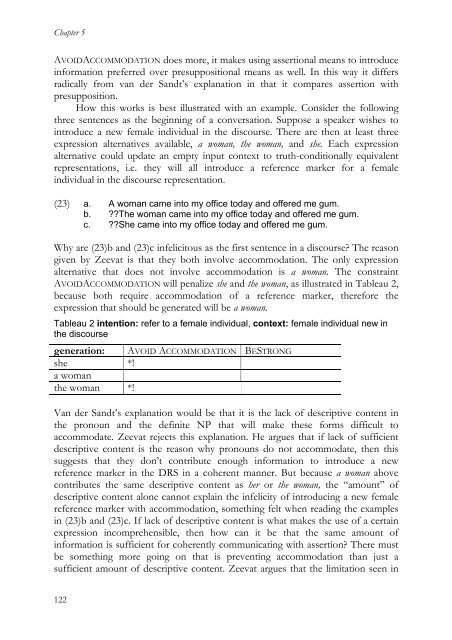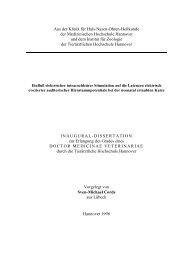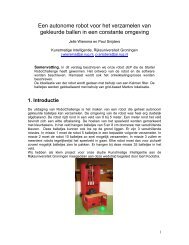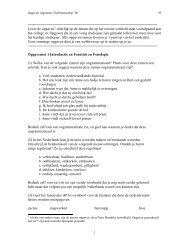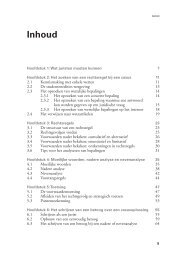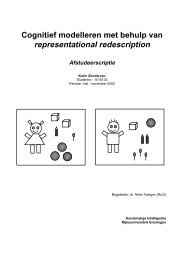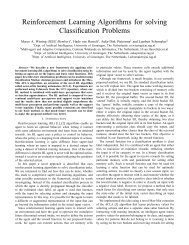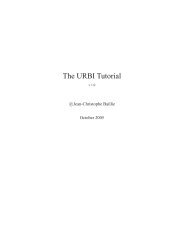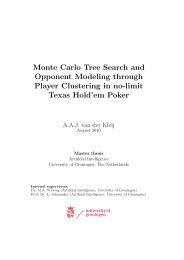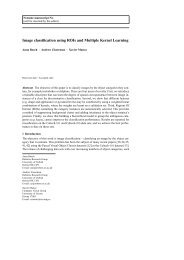Presuppositions in Spoken Discourse
Presuppositions in Spoken Discourse
Presuppositions in Spoken Discourse
Create successful ePaper yourself
Turn your PDF publications into a flip-book with our unique Google optimized e-Paper software.
Chapter 5<br />
AVOIDACCOMMODATION does more, it makes us<strong>in</strong>g assertional means to <strong>in</strong>troduce<br />
<strong>in</strong>formation preferred over presuppositional means as well. In this way it differs<br />
radically from van der Sandt’s explanation <strong>in</strong> that it compares assertion with<br />
presupposition.<br />
How this works is best illustrated with an example. Consider the follow<strong>in</strong>g<br />
three sentences as the beg<strong>in</strong>n<strong>in</strong>g of a conversation. Suppose a speaker wishes to<br />
<strong>in</strong>troduce a new female <strong>in</strong>dividual <strong>in</strong> the discourse. There are then at least three<br />
expression alternatives available, a woman, the woman, and she. Each expression<br />
alternative could update an empty <strong>in</strong>put context to truth-conditionally equivalent<br />
representations, i.e. they will all <strong>in</strong>troduce a reference marker for a female<br />
<strong>in</strong>dividual <strong>in</strong> the discourse representation.<br />
(23) a. A woman came <strong>in</strong>to my office today and offered me gum.<br />
b. ??The woman came <strong>in</strong>to my office today and offered me gum.<br />
c. ??She came <strong>in</strong>to my office today and offered me gum.<br />
Why are (23)b and (23)c <strong>in</strong>felicitous as the first sentence <strong>in</strong> a discourse? The reason<br />
given by Zeevat is that they both <strong>in</strong>volve accommodation. The only expression<br />
alternative that does not <strong>in</strong>volve accommodation is a woman. The constra<strong>in</strong>t<br />
AVOIDACCOMMODATION will penalize she and the woman, as illustrated <strong>in</strong> Tableau 2,<br />
because both require accommodation of a reference marker, therefore the<br />
expression that should be generated will be a woman.<br />
Tableau 2 <strong>in</strong>tention: refer to a female <strong>in</strong>dividual, context: female <strong>in</strong>dividual new <strong>in</strong><br />
the discourse<br />
generation: AVOID ACCOMMODATION BESTRONG<br />
she *!<br />
a woman<br />
the woman *!<br />
Van der Sandt’s explanation would be that it is the lack of descriptive content <strong>in</strong><br />
the pronoun and the def<strong>in</strong>ite NP that will make these forms difficult to<br />
accommodate. Zeevat rejects this explanation. He argues that if lack of sufficient<br />
descriptive content is the reason why pronouns do not accommodate, then this<br />
suggests that they don’t contribute enough <strong>in</strong>formation to <strong>in</strong>troduce a new<br />
reference marker <strong>in</strong> the DRS <strong>in</strong> a coherent manner. But because a woman above<br />
contributes the same descriptive content as her or the woman, the “amount” of<br />
descriptive content alone cannot expla<strong>in</strong> the <strong>in</strong>felicity of <strong>in</strong>troduc<strong>in</strong>g a new female<br />
reference marker with accommodation, someth<strong>in</strong>g felt when read<strong>in</strong>g the examples<br />
<strong>in</strong> (23)b and (23)c. If lack of descriptive content is what makes the use of a certa<strong>in</strong><br />
expression <strong>in</strong>comprehensible, then how can it be that the same amount of<br />
<strong>in</strong>formation is sufficient for coherently communicat<strong>in</strong>g with assertion? There must<br />
be someth<strong>in</strong>g more go<strong>in</strong>g on that is prevent<strong>in</strong>g accommodation than just a<br />
sufficient amount of descriptive content. Zeevat argues that the limitation seen <strong>in</strong><br />
122


